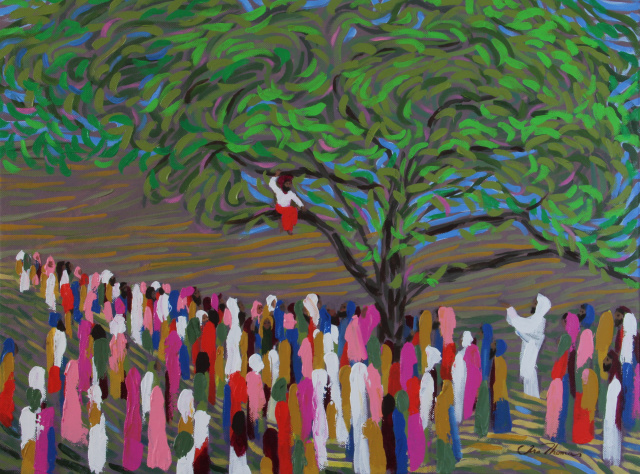By Reverend Roger Carr-Jones, Marriage & Family Life Co0rdinator for the Diocese of Westminster
I have three vocations: Christian, husband and deacon; it is the first that informs the whole, and, for me, Zacchaeus is the model of domestic discipleship par excellence. It is in the domestic sphere as Cardinal Hume once said that 98.2% vocations are lived.
One of the easiest ways to think of the Christian life is to see it in terms of a journey. The scriptures and especially the gospels are filled with a variety of stories in which journeys are central. To embark upon a journey, we need to have a clear sense of our destination, to plan what to take, and at times to learn how to adapt to changing circumstances along the way. In a similar vein the Christian journey, which began at baptism also has those moments of invitation from Christ as we walk along our unique path that is a part of the Way. There are also those invitations from Christ of ‘Come and see’, or the more enigmatic and for me deeply personal ‘I must stay at your house today’. Which of these two invitations attracts you the most?
In our journey of faith there is always that struggle with the enemy of the human race, who would make us believe that we are incapable of the journey, ill-equipped and useless. Again, the stories in the scriptures warn of bandits and other dangers once we venture through the wilderness, or along the dark streets. That is where it is useful to have guides to assist us along some of the paths in life, so that we can be well-equipped to deal with the situations that can arise to challenge, or dent our faith. For many people one guide was the late Tony Horan SJ, small in stature, yet tenuous in action opening up for the People of God the beauty and the depth of the Ignatian way.
Tony though would prefer use of the term ‘accompanier’, a gentle reminder that it is always about the pilgrim’s journey, not the accompanier. It is the coming alongside someone on the journey that is the key feature. It is the same model that Jesus gives us through the people and situations that he encounters. Think of the encounter with blind Bartimaeus, the woman with the haemorrhage, or the lepers on the road. In this accompanied space between Jesus and the person, a life-changing encounter happens. Jesus’ accompaniment makes the invisible God visible to those he meets.1 The Christian is called to be both a pilgrim and an accompanier. Our journey along the Way is personal, yet lived in a corporate setting.
Of course, there are times in life when we feel ill-equipped in either role, so it is fitting that we should have use of an extract from an article by Tony Horan on discipleship produced for the Christian Life Community.
'Later on in my life I made the full Spiritual Exercises of St Ignatius and a much deeper conversion took place. I came to know Christ as someone who died for me because he loved me, sins and all. I wanted to love him in return and to do something for him who had done so much for me. I knew Christ was inviting me to work with him to bring about his kingdom of peace and justice and love. The invitation to be with Christ in his work was irresistible. My response now came from the heart. Much the same things were there to do, but I had discovered my mission. I like to think that this changed the way I fulfilled my responsibilities. I did them because I wanted to.
'The things to be done were not always easy and sometimes I was far from good at doing them. They could be painful and the prospect of them might fill me with dread. But then what Christ did and faced for me was terrible. I knew that I wasn’t being invited to work with Christ out of my strength, but rather out of my weakness. This was all that I had to give Christ for him to use and transform.’
It is with this final thought in mind our journey today takes us to Jericho, where we will encounter the meeting between Jesus and Zacchaeus. In his gospel Luke uses a single journey as a symbol of Jesus’ whole mission and vocation. This encounter is the last staging point before his arrival in Jerusalem and all that it will entail. Let us be held by the opening words 'He entered Jericho and was passing through'. This gives the impression that Jesus had no purpose in being there and yet it is a hugely important encounter for us all.
How often in our lives are we just passing through a place or a moment and yet it suddenly became transformative. Perhaps we all have pieces of scripture that continue to speak to us irrespective of the number of times we read, or hear them. In that phrase ‘Come down, Zacchaeus’ do we not hear our own name being called? In the person of Zacchaeus, we are presented with someone painfully aware of their own situation in life.
Tony shared that it was the awareness of his own weakness that he offered to Jesus. In doing so he was transformed. In Zacchaeus we have one who in the eyes of the world has little to offer and yet it is to him that Jesus will say ‘I must stay in your house’. Think for a moment of the opening scene of Luke’s gospel and the words offered to Mary by Gabriel ‘Rejoice, you who have received favour: the Lord is with you’,2 or the calling of the first disciples in John 1: 35-51). It is the theology of vocation in which God in the person of Jesus, who makes the first move, drawing them towards him, either directly, or through the action of others. God makes the first move, leaves us free to respond to that move and then deals with each of us in a uniquely personal way.3
God takes us where he finds us and in the example of Zacchaeus, we have one called to discipleship and to holiness whilst remaining in the world in his ordinary life. We are both pilgrim and accompanier. Zacchaeus makes sacrifices and changes to his life, but his spirituality will be lived out in the domestic setting, one to which most of us will be called.
Image: Ira Thomas, catholicworldart.com
1 https://www.ignatianspirituality.com/the-posture-of-accompaniment/
2 Nick King SJ The New Testament Kevin Mayhew Ltd 2004
3 Thomas H Green SJ Come down Zacchaeus Spirituality & the Laity Ave Maria Press 1987, p11




